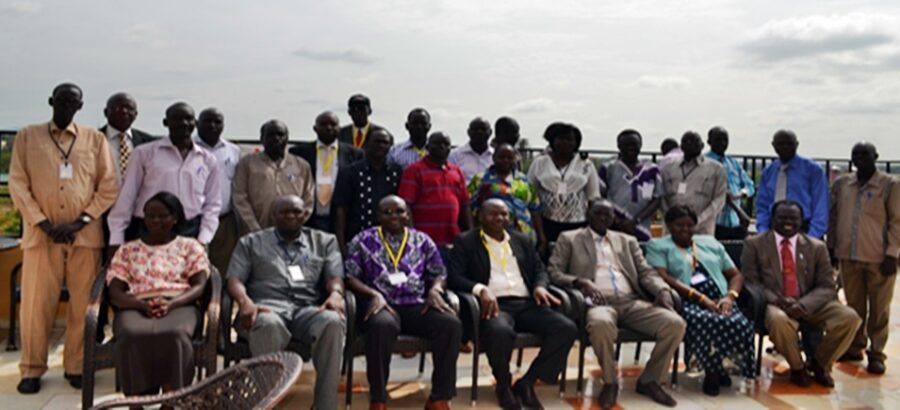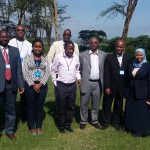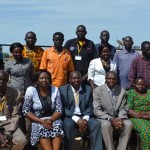Introduction
In fulfilment of the Activity plans for 2015 for South Sudan under the Standard Methods and Procedures in Animal Health Project, a national SMP roll-out workshop for South Sudan was held at James Hotel in Juba 1st to 3rd June 2015. Its main aim was to roll-out ready Standard Methods and Procedures (SMPs) for FMD, PPR, RVF and brucellosis to veterinary stakeholders within South Sudan to create awareness in order to foster smooth implementation of the SMPs. This initial workshop brought together key players in animal health services mainly from the public sectors who are engaged in livestock and wildlife services. In addition, the workshop reviewed the status of livestock diseases in the States and their control and as well discussed avenues to promote local and export trade in livestock and livestock products. A total of 39 participants drawn from Ministry of Livestock and Fisheries, Departments of Veterinary Services in eight States, Wildlife Services, and Pharmaceutical companies, FAO-South Sudan, ICRC, AU-IBAR and IGAD attended the workshop.
In his remarks, Dr Joseph Magona, on behalf of the Director, AU-IBAR, Prof. Ahmed Elsawalhy, appreciated efforts made by the Government of South Sudan in general and Ministry of Livestock and Fisheries in particular in organizing the SMP roll-out workshop. He highlighted the substantial contribution livestock resource make towards the national economy, food security and livelihoods of communities. He further noted that transboundary animal diseases (TADs) continue to affect livestock production and trade in the region. He stated that the SMP roll-out workshop was intended to disseminate ready SMPs, namely, FMD, PPR, RVF and brucellosis to all national stakeholders in order to initiate implementation at national level. Finally, he encouraged all livestock stakeholders in South Sudan to embrace the implementation of the SMPs for FMD, PPR, RVF and brucellosis during implementation of disease control programmes and regulation of trade in livestock and livestock products.
In his opening remarks, Dr Jacob Korok, Director General of Veterinary Services for South Sudan, pointed out the importance of the project and how the project will benefit South Sudan. Ultimately he welcomed all participants to the workshop and declared the workshop officially open.
The workshop achieved the following:
- A diverse array of Stakeholder sensitize about the SMPs and the SMP concept
- A feedback mechanism for the implementation of the SMPs in South Sudan discussed
- Status of diseases, their control and associated challenges in the States reviewed
- Modalities to promote trade in livestock and livestock products in South Sudan discussed
Proceedings
The workshop was conducted through presentations, plenary discussion and group work. Meanwhile each participant was given a copy of the SMPs.
Key topics discussed
Key topics discussed included the following:
- Overview of the SMP-AH Project
- Concept of SMP & Development of SMPs
- Disease Control Part of SMPs (including Quarantine Services SMP)
- Diagnosis Component of SMPs
- Surveillance component of SMPs
- General discussion on SMPs
- Field Experiences in Controlling trade Sensitive TADS in the States
- Marketing Strategies and Livestock Trade in South Sudan
- Status of Veterinary Services in South Sudan
- The Role of LITS in Disease Surveillance
- Passive Surveillance Guidelines
- Laboratory Biorisk/Biosafety Management Manual
- Development of Action Plan for the implementation of the SMPs
Developments of action plans
Group work on the development of follow-up on activity implementation identified the following areas for immediate action:
- To organize a national workshop to develop an implementation plan for SMPs in South Sudan
- To organize 3 regional Roll-out SMP workshops for stakeholders from the ten States and the two Administrative Areas which will include Government, Private Sector, key NGOs and UN agencies. One meeting in Juba for greater Equatoria (Central ,Western and Eastern Equatoria States), another in Wau for great Bahr el Ghazal (Western Bahr el Ghazal, Northern Bahr el Ghazal, Warap States and Abei AA) and another in Bor for greater Upper Nile (Jonglei, Upper Nile, Unity state and Greater Pibor AA)
- To ensure implementation of SMPs and sending of feedback from 3 entry points (Nimule, Nadapal and Kaya) along the international borders
- Facilitate formation of association for pastoralists and livestock traders and a National umbrella Union which will lead to the participation of South Sudan in NEALCO and other regional forums
- To develop and disseminate extension materials in ten States and the two AAA & PAA to create awareness on the control of transboundary animal diseases
Recommendations
Upon discussion on the afore-mentioned topics and pertinent concerns arising therein, the participants recommended the following:
To Government of Republic South Sudan (GRSS) and AU-IBAR
- To build strong coordination and collaboration between the Veterinary Authorities of South Sudan and the neighbouring countries in diseases surveillance and quarantine across the borders
To GRSS, IGAD/ICPALD
- To facilitate formation of pastoralist and livestock traders associations which will lead to the participation of South Sudan in NEALCO and other regional forums
To GRSS
- To facilitate livestock trade between the neighbouring countries through regulatory frame work and encourage private sector investment in livestock trade.
- To establish quarantines facilities meeting minimum standards at border check points and entry points
- To enhance collaboration and harmonization between Ministry of Livestock and Wildlife Services by sharing information and capacity building of Wildlife livestock staff in surveillance and testing of samples in CVL
- To incorporate the implementation of the SMPs in the national veterinary policy and regulation to institutionalize it
To GRSS, SMARF, AA
- To implement the SMP and Syndromic manuals and provide feedbacks on the success and challenges thereafter.
Way forward
- Organize a workshop for developing an implementation plan for the SMPs
- SMP AH team will work with the State Ministries of Animal Resources and Fisheries, private sectors, NGOs, and Agencies to ensure the implementation of the Action Plan.
- The SMP AH Coordinator should follow up the procurement and delivery of materials and equipment for the timely implementation of the Action Plan
- SMPAH team should monitor the follow-up on the recommendation.
- SMPAH focal person and the Director-General of Veterinary Services to ensure institutionalization of the implementation of SMPs in South Sudan






